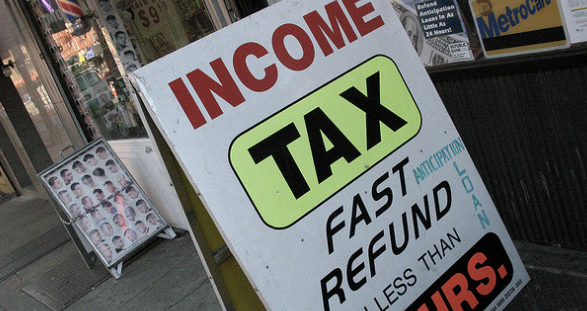CFPB, Navajo Nation Team Up To Put An End To Tax Scheme Targeting Low-Income Consumers
For many low-income consumers, tax time provides an opportunity to catch up on bills and get back on track financially. Unfortunately, there are unscrupulous companies out there that aim to make money of these same consumers by pointing them in the direction of high-cost tax-refund-anticipation loans. That appears to be the case for the owner of New Mexico-based H&R Block franchises and a tax-time loan company operating an alleged illegal tax-refund scheme.
The CFPB and the Navajo Nation filed charges against Jeffrey Scott Thomas and his company, J. Thomas Development of NM Inc., as well as Dennis Gonzalez and his loan company S/W Tax Loans (Southwest) for allegedly participating in a scam to steer low-income consumers into expensive and risky tax-refund-anticipation loans in which the defendants collected fees and interest to the tune of hundreds of thousands of dollars.
According to the CFPB complaint [PDF], Thomas operated four H&R Block franchises that catered to largely low-income citizens of the Navajo Nation who qualified for and relied upon the federal anti-poverty program called Earned Income Tax Credit.
Thomas had previously set up and financed Southwest, which offered short-term, high-interest loans that consumers could secure using their anticipated tax refunds. After establishing the company, Thomas appointed his friend Gonzales as owner and president, according to the complaint.
The Bureau and the Navajo Nation determined that H&R Block did not participate in the scheme, and has already terminated its relationship with the franchises – which eventually shut down in the fall of 2014.
The CFPB claims that to carry out the scam, Thomas instructed tax preparers at his stores to offer only loans from Southwest, and not more affordable loans provided by H&R Block.
Unbeknownst to clients, Thomas earned interest and fees on the costly loans and paid his tax preparers bonuses based on the number of refund-anticipation loans their clients took out, according to the CFPB.
In addition to withholding his own financial stake in the loans from clients, Thomas “illegally and grossly” understated the loans’ annual percentage rates, which often exceeded 250%.
The CFPB also accuses the company of unfairly failing to disclose the availability of consumers’ tax refunds when inquiries were made.
According to the complaint, Southwest did not disclose to more than 1,500 consumers that their tax refunds had been received from the IRS and were already being processed by the company. Instead, when these consumers inquired about the status of their refund, Southwest persuaded the consumers to take out a second or third refund-anticipation loan.
This practice resulted in consumers paying a finance charge for an unnecessary high-interest loan. In all, the CFPB estimates consumers incurred over $254,000 in unnecessary interest and fees.
Under the CFPB’s proposed order [PDF] resolving the case, the defendants would be responsible for paying $254,267 in redress to consumers – enough to give full refunds of interest and fees to consumers who took out a second or third refund-anticipation loan. That figure is on top of the roughly $184,000 in refunds that Southwest already provided consumers harmed by Southwest’s deceptive APR disclosures.
Additionally, the defendants would be required to pay $438,000 to the CFPB’s Civil Penalty Fund.
Today’s charges mark the first time the Navajo Nation has sued a border town tax lending service, Paul Spruhan, Navajo Nation Assistant Attorney General, said in a statement.
“This action puts lenders on notice that the Navajo Nation is prepared to enforce federal laws against predatory lenders to protect its citizens,” he continued.
The CFPB signed an agreement with the Navajo Nation back in 2013 to work with the Nation’s Department of Justice on consumer financial issues. CFPB Director Richard Cordray said in a statement that today’s action marks a milestone in the relationship between the two entities and a step forward in protecting consumers from deceptive financial companies.
CFPB and Navajo Nation Take Action to Stop an Illegal Tax-Refund Scheme [CFPB]
Want more consumer news? Visit our parent organization, Consumer Reports, for the latest on scams, recalls, and other consumer issues.


